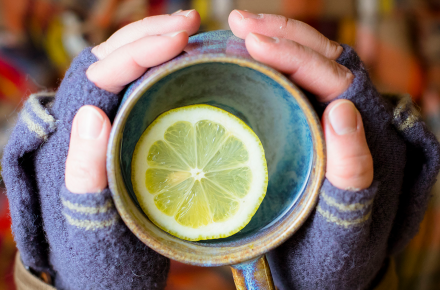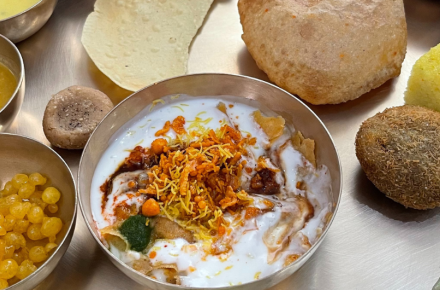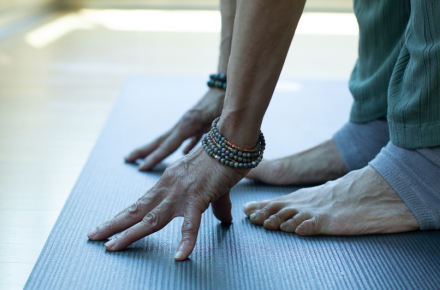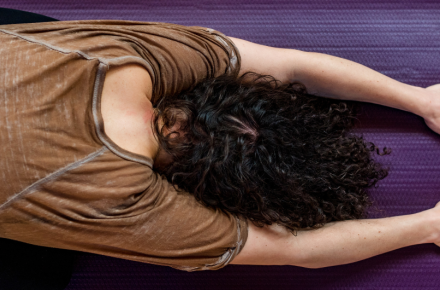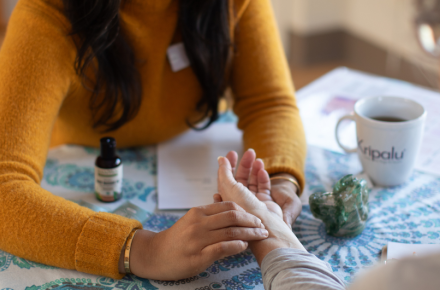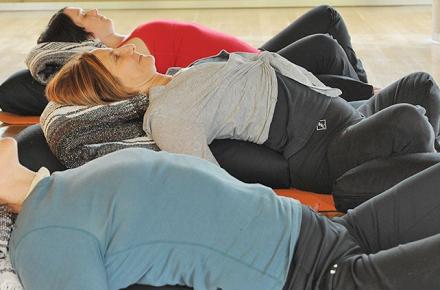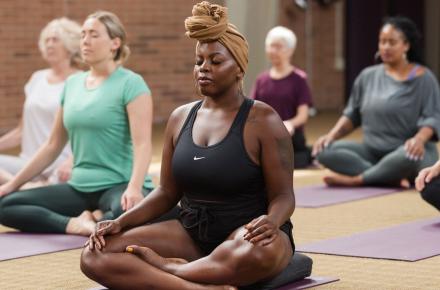10 Ayurvedic Stress Busters for the Holidays

The holiday season is here! If your stress levels are rising, Ayurveda can help you boost your resilience. From an Ayurvedic perspective, says Kripalu School of Ayurveda Academic Coordinator Lauren Gernady, stress aggravates the subtle energies of vata dosha—the quality that governs movement and the nervous system. When vata is out of balance, symptoms such as digestive distress, dry skin, achy joints, anxiety, low energy, and irregular, insufficient sleep patterns begin to set in.
To tame your vata dosha before (and during) the holidays, try these self-care strategies.
Follow a daily routine. Develop a healthy lifestyle routine before the holidays hit, and stick to it as you head into the new year, Lauren suggests. At a minimum, go to bed, eat your meals, and wake up around the same time every day. “Routine is vata’s best friend,” says Lauren. Bonus points: Follow her Ayurvedic morning routine.
Spend time in nature. Studies show that spending time in green spaces, such as forests, can reduce stress. “Blood pressure, heart rate, muscle tension and the level of ‘stress hormones’ all decrease faster in natural settings,” reports a summary published on Science Daily. From an Ayurvedic perspective, says Lauren, spending time in nature is “a balm for our nervous system.” On a mental level, “it quiets the mind by increasing sattva, a quality of the mind associated with purity, serenity and truth, and reducing rajas, a quality of the mind associated with agitation and disturbance.”
Try a relaxing form of yoga. Yin Yoga, for example, is a soothing practice that allows the body to slowly and safely release deeply held tensions. Pressed for time? Try Viparita Karani, or Legs Up the Wall pose, for 10 minutes after work or at bedtime. This pose is the perfect antidote to the stresses of the holiday season, says Lauren.
Exercise in moderation. If you’re already suffering from a vata imbalance, resist the urge to do high-intensity exercise; it can exacerbate the mobile qualities of vata and make you feel more out of balance. “Instead, opt for a form of exercise that is slow and steady, preferably one that takes you outdoors and does not involve loud pounding music, which can aggravate vata,” Lauren suggests. “Take a stroll or a gentle hike with a furry friend, go for a mild jog, sign up for a moderate yoga class, or take a meditative swim.”
Practice Nadi Shodhana (Alternate-Nostril Breath). “This is a deeply calming form of pranayama that works to balance the right and left hemispheres of the brain,” says Lauren. Breathing practices deactivate the sympathetic nervous system, the system that monitors our “fight or flight” response, and activate the parasympathetic nervous system, which governs our “rest and digest” response—so that we can approach holiday stressors with equanimity.
Eat in a loving, relaxed environment. The kind of company we keep—and the conversations we have—during meals can positively or negatively affect our ability to digest and assimilate our meal, observes Lauren. According to Ayurveda, if we eat with angry people in a tense, negative environment, our bodies may produce ama, a subtle form of toxic residue that is considered to be the breeding ground for disease. Instead, surround yourself with positive, loving company at mealtimes, or eat peacefully by yourself. Your stomach, and your spirit, will thank you.
Drink tulsi tea. Try substituting your morning cup of coffee with a mug of tulsi tea. Regarded in Ayurveda as the “queen of the herbs,” tulsi, or holy basil, is a powerful adaptogen that is said to uplift the mood, aid in digestion, and strengthen the immune system, Lauren explains. “Adaptogens help the body adapt to stress while normalizing the effects that stress has upon the bodily processes.” Steep one bag (or one teaspoon of loose leaf tea) in a cup of boiling water for five minutes, strain (if using loose tea), and enjoy.
Give yourself an Ayurvedic oil massage. Massaging yourself with warm, herbalized oil every morning—known in Ayurveda as abhyanga—is a phenomenal way to soothe the nervous system and ground aggravated vata. It nourishes and moisturizes the skin (which can be dry during the cold season) and may facilitate the release of oxytocin, a feel-good hormone that can lift your mood. “That’s why abhyanga is often referred to as the crowning jewel of Ayurveda,” says Lauren.
Do a mini-detox before the holidays. To stoke your digestive fire before a feast, try a gentle three-day cleanse with kitchari or a simple diet of cooked whole grains with steamed veggies. Steer clear of wheat, meat, dairy and sugar during those three days (or for however long you want your cleanse to last) because those foods are harder to digest, says Lauren. “Think of it as a mini-vacation for your digestive system.
Take a ginger bath. Draw a warm bath and add 1/3 cup of powdered ginger and 1/3 cup of baking soda. Mix well, then let stress melt away as you soak in the bath for roughly 15 to 20 minutes (unless you find yourself overheating). To further calm vata, dim the lights and unwind with soothing music. Sweet dreams!
© Kripalu Center for Yoga & Health. All rights reserved. To request permission to reprint, please e-mail editor@kripalu.org.







